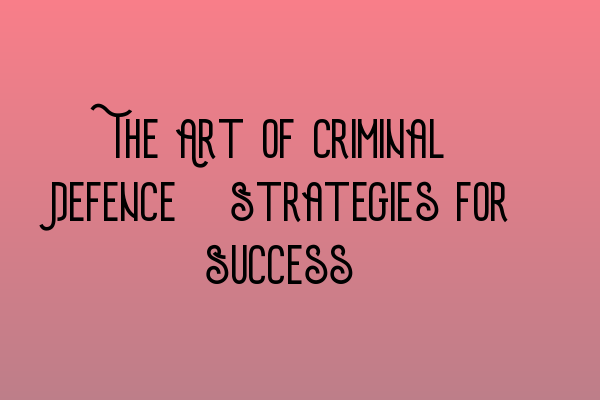The Art of Criminal Defence: Strategies for Success
Welcome to the SQE Criminal Law & Practice Law UK blog! In today’s post, we will delve into the fascinating world of criminal defence and explore the strategies for success that every aspiring criminal lawyer should know.
The Role of a Criminal Defence Solicitor
As a criminal defence solicitor, your role is to protect the rights of your clients who are facing criminal charges. Your expertise and knowledge of criminal law will be put to the test as you navigate through complex legal proceedings, gather evidence, and build a strong defence case.
One crucial aspect of being a successful criminal defence solicitor is understanding the various strategies that can be employed to achieve the best possible outcome for your client. Let’s explore some of these strategies in more detail below.
1. Thorough Case Analysis
Before formulating any defence strategy, it is essential to conduct a thorough analysis of the case. This involves reviewing all relevant evidence, witness statements, and legal precedents. By gaining a comprehensive understanding of the facts and legal complexities of the case, you can identify potential weaknesses in the prosecution’s argument and develop a strong defence strategy.
2. Effective Communication
Communication is key in criminal defence. Building trust and establishing effective communication with your client is essential for obtaining all the necessary information and evidence to build a solid defence case. Additionally, effective communication with the prosecution, judges, and other legal professionals can help negotiate plea deals or secure more favorable outcomes for your client.
3. Expert Witness Testimony
In many criminal cases, expert witness testimony can play a crucial role in supporting your defence. Expert witnesses with specialized knowledge in relevant fields can provide valuable insights and opinions that can challenge the prosecution’s case. It is essential to identify and engage the right experts who can strengthen your defence arguments.
4. Legal Precedents and Case Law
Knowledge of legal precedents and case law is invaluable when building a defence case. By researching and referencing past cases with similar facts and legal issues, you can craft persuasive arguments that rely on established legal principles. Integration of relevant case law strengthens your defence and increases the chances of obtaining a successful outcome.
In order to prepare for a successful career in criminal defence, it is crucial to acquire the necessary legal knowledge and practical skills. SQE 1 Preparation Courses and SQE 2 Preparation Courses are designed to equip aspiring solicitors with the essential knowledge and skills required to pass the SRA SQE exams.
As you progress in your career, continuous practice and improvement is essential for success. Utilizing SQE 1 Practice Exam Questions and SQE 1 Practice Mocks FLK1 FLK2 can help you sharpen your legal analysis and problem-solving abilities. These practice resources simulate the exam environment and enable you to assess your strengths and identify areas for improvement.
Stay up-to-date with the latest SRA SQE Exam Dates to ensure that you are well-prepared and can plan your study and career progression accordingly.
In conclusion, the art of criminal defence requires a combination of legal knowledge, analytical skills, effective communication, and a deep understanding of the strategies that can be employed to achieve the best outcomes for clients. By employing these strategies, continuously honing your skills, and staying informed about the latest legal developments, you can become a successful criminal defence solicitor.
Thank you for reading our blog post. We hope you found it informative and useful. If you have any questions or would like to learn more about our SQE preparation courses, please contact us for further assistance.
